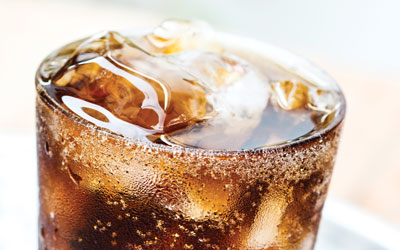Fat & Sugar Reduction: PepsiCo R&D, a catalyst for change in the food and beverage industry
- Like
- Digg
- Del
- Tumblr
- VKontakte
- Buffer
- Love This
- Odnoklassniki
- Meneame
- Blogger
- Amazon
- Yahoo Mail
- Gmail
- AOL
- Newsvine
- HackerNews
- Evernote
- MySpace
- Mail.ru
- Viadeo
- Line
- Comments
- Yummly
- SMS
- Viber
- Telegram
- Subscribe
- Skype
- Facebook Messenger
- Kakao
- LiveJournal
- Yammer
- Edgar
- Fintel
- Mix
- Instapaper
- Copy Link
Posted: 1 September 2015 | Dr. Mehmood Khan, Vice Chairman and Chief Scientific Officer of Global R&D, PepsiCo | No comments yet
PepsiCo products are enjoyed by consumers one billion times a day in more than 200 countries and territories around the world. To satisfy the world’s appetite, we must constantly adapt, evolve and innovate. Our Global Research and Development (R&D) organisation is a catalyst for change, transforming our company and its portfolio. That is why R&D is working closely with our business partners to deliver on today’s brand and market priorities as well as the growth opportunities of tomorrow.


When I joined the company in 2007 as Head of R&D, PepsiCo Chairman and Chief Executive Officer Indra Nooyi and I were keen to expand the definition of what a food and beverage company R&D function was – and could accomplish. One of the first things we did to usher in transformation was to recruit scientific talent no one ever expected to see inside a traditional food and beverage company. In my own case, I was trained as an endocrinologist; the PepsiCo R&D team includes experts in areas such as agronomy, exercise physiology, metabolomics, rheology, and computational analysis nutrition science, in addition to the traditional food and beverages science skills we have relied upon for decades to bring great products to market. With the diverse R&D team we assembled, a strong signal was sent to the world about our approach to product development, innovation and design.
This new team allowed us to adopt a more rigorously science-based, research direction. An R&D function that was for decades focused almost exclusively on the consumer’s taste experience began to focus on the consumer’s entire body (i.e. overall biology) and preference drivers (i.e. taste, aroma, texture, convenience) to deliver the right product offerings. We continue to expand our portfolio of nutritious products across multiple markets to unlock growth opportunities in new product categories, such as dairy, fruits and vegetables, hummus and other fresh dips, and baked grain snacks. This evolution resulted in an expanded, more diversified portfolio featuring our traditional “Fun for You” products; “Better for You” products; and “Good for You” products. Today, our growing nutrition offerings account for approximately 20% of our net revenue.
Our actions were informed in part by the shift we saw in the marketplace. On one hand, consumers wanted more nutritious products with reduced levels of sodium, saturated fats and added sugars. On the other, consumers still expected our products to deliver the same great taste experience. Accordingly, in 2009, we established ambitious targets for the reduction of sodium, saturated fats and added sugars in our key global brands.
Our human sustainability goals:
- Reduce the average amount of saturated fats per serving in key global food brands, in key countries, by 15% by 2020, against a 2006 baseline
- Reduce the average amount of added sugars per serving in key global beverage brands, in key countries, by 25% by 2020, against a 2006 baseline
- Reduce the average amount of sodium per serving in key global food brands, in key countries, by 25% by 2020, against a 2006 baseline
Six years on, we offer reduced-calorie options for virtually every drink we make and every occasion we serve. Over the past several years, we’ve introduced a number of low- and zero-calorie beverage choices. Our R&D teams are reducing sugar in existing products and continue to deliver a steady pipeline of new, lower calorie products with all the great taste of full-calorie offerings. Fifteen years ago, less than one quarter of our sales came from zero- or low-calorie beverages, active hydration beverages and healthy juices. Today, we’re selling a balanced portfolio: close to 50% of sales come from these healthier categories, which have become a vital growth engine for our business.
By balancing the choices we offer consumers, we’ve lowered the average number of calories per serving in our beverages by more than 15% – down to 65 calories per serving today. And with our continued commitment to product innovation and growing consumer interest in balanced beverage choices, we’re working to continue, if not accelerate, these trends in the years ahead.
We’re enabling consumers to make educated choices about beverage consumption. And, through product innovation, smaller portion sizes, and clear calorie labelling at point of sale, we’re making it easier for consumers to choose lower-calorie options. It’s all about choices, great-tasting choices, with or without the calories.
While there is more work to be done, we believe we have made significant progress in our efforts to reduce the levels of sugar, salt and saturated fat – all based on major technological breakthroughs. Here are some highlights:
- We removed approximately 402,000 metric tons of added sugar from our beverage portfolio in North America as compared to 2006. Further, we developed naturally sourced sweeteners – like Stevia – and flavorings, which are the best paths to a meaningful reduction in added sugars
- We removed 3,900 metric tons of sodium from total our food portfolio in key global markets compared to our 2006 baseline. We continue to invest in new technologies and recipes that allow us to reduce sodium levels
- By switching in certain instances to oils that contain lower saturated fat, and by providing more snacks that are baked, we’ve made significant reductions in saturated fat. The result: We’ve removed approximately 2,100 metric tons of saturated fat from key global brands in key markets as compared to 2006
We are heartened by the progress we have made in our efforts to transform the PepsiCo portfolio. Of course, the moment of truth occurs at the checkout counter. And there, I’m pleased to say, we’ve done very well. We had ten of the top 50 new food and beverage products introduced in North America in 2014 (this is up from 9 of the top 50 in 2013). Indeed, a number of our recent product introductions, like Tostitos Cantina, Mountain Dew Kickstart and Pure Leaf tea, generated double-digit estimated annual retail sales growth in 2014 after achieving more than $100 million in their launch year.
Furthermore, our company – which generated more than $66 billion in net revenue in 2013 – has 22 billion-dollar brands in our portfolio. This is the direct result of our constant, never-ending process of innovation. In fact, we’ve grown the number of billion-dollar brands by nearly 30% since 2006. We have another 40+ brands in our portfolio that generate $250 million to $1 billion in estimated annual retail sales, creating attractive opportunities for continued innovation and growth across the portfolio. Many of these 22 billion-dollar brands are iconic, category-leading brands that have been consumer favorites in the marketplace for years – and that is by design. We don’t rest solely on the equity of those brands; our R&D teams are constantly innovating and transforming to stay ahead of consumer trends.
PepsiCo is continuously innovating to drive top-line and bottom-line growth. We now offer more than 2,000 enjoyable and nutritious foods and beverages globally. Our investments in R&D at PepsiCo – up more than 35% since 2011- unleashed innovation, creating a competitive ‘advantage gap’ for the company that widens as the company continues to innovate and re-invest. As a result of our self-disruption, innovation is now generating nine percent of net revenue at PepsiCo (up from seven percent in 2012).
More than ever, PepsiCo’s Global R&D organisation is helping drive PepsiCo’s business by providing unrivaled technical skills and capabilities to offer more enjoyable and nutritious foods and beverages to more people, in more places, engendering more trust worldwide.
References
- Pepsi, Lay’s, Mountain Dew, and Doritos.
- Baked Lay’s, Diet Pepsi, and Stacy’s pita chips.
- Quaker, Tropicana, Trop50 (with 50% less sugar and calories than regular juice), Tropicana Farmstand (a fruit and veggie juice offering that provides one serving of fruit and veggie with each serving), Naked Juice and Smoothies, Naked Nutmilk, Naked Coconut Water, Gatorade (which includes protein shakes and bars) and Sabra hummus.
About the author
Mehmood Khan, M.D., is executive vice president and chief scientific officer of global research and development at PepsiCo. As chief scientific officer, Mehmood leads company-wide research and development; recruits highly regarded scientists, global health and medical experts; launches research projects with leading universities; and opens advanced R&D facilities. As executive vice president, Mehmood leads a global team of experts across many fields. Prior to joining PepsiCo, Mehmood was President at Takeda Global Research & Development Center. Previous to this he was a faculty member at the Mayo Medical School in Rochester, Minn., serving as Director of the Diabetes, Endocrine and Nutritional Trials Unit in the endocrinology division.








